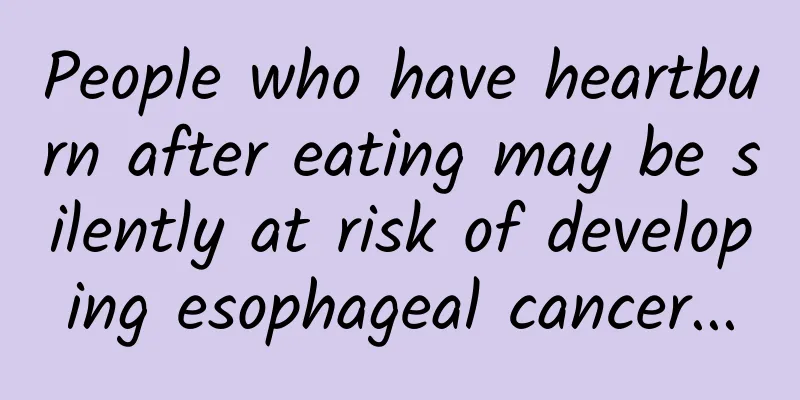People who have heartburn after eating may be silently at risk of developing esophageal cancer...

|
Many people have had this experience in life: they feel sour in their mouths right after eating, and their stomachs churn with all kinds of discomfort. The discomfort can only be slightly relieved by swallowing saliva immediately or drinking plenty of water. Image source: unsplash.com If you often have this phenomenon of acid reflux after meals, don't take it lightly. This may be a symptom caused by gastroesophageal reflux disease, or it may be a precursor to some stomach diseases. If left unchecked, the digestive tract will be damaged over the years, and it is very likely that the entire stomach will be "scrapped". Data shows that about 165 million people in my country suffer from gastroesophageal reflux disease, accounting for about 12.7% of the total population of my country. The huge number should not be underestimated. So, what causes gastroesophageal reflux disease? How to effectively prevent it in life? Today we will explain it to you one by one. Acid Reflux: "Danger of Reflux" The esophagus is the only passage for food to reach the stomach, and under normal circumstances, food will not reflux. There is a "one-way valve" called the cardia between the stomach and the esophagus, which is controlled by the lower esophageal sphincter. It not only helps food enter the stomach smoothly, but also prevents stomach contents from refluxing into the esophagus during the "reverse" peristalsis of the stomach. When it cannot close normally, the pressure in the stomach increases, and the contents of the stomach and duodenum will be squeezed into the esophagus, causing gastric contents to reflux, which is the phenomenon of gastroesophageal reflux. Since normal gastric acid is a strong acid with a pH of less than 2, but the inner wall of the esophagus does not have substances that resist this acid, if left unchecked, it will develop into gastroesophageal reflux disease (GERD) under long-term stimulation. This is an unfamiliar term to many people, but the symptoms it causes are very common and widespread. Generally, they are divided into two categories: esophageal symptoms and extraesophageal symptoms. 1. The typical symptoms of gastroesophageal reflux disease are heartburn and (or) acid reflux. Heartburn refers to a burning sensation behind the sternum and under the xiphoid process, which usually occurs one hour after a meal, especially when lying flat, bending over, or with increased abdominal pressure, the stomach contents often irritate the normal inner wall of the esophagus. 2. Patients with severe esophagitis or esophageal ulcers may experience swallowing pain, which is caused by acidic reflux stimulating the sensory nerve endings under the esophageal epithelium. In severe cases, it may be a severe stabbing pain that radiates to the back, waist, shoulders, and neck, similar to angina pectoris. 3. Atypical symptoms outside the esophagus are wide-ranging, including manifestations in single or multiple parts of the throat, trachea, bronchi, oral cavity, nasal cavity, and ears. Specific manifestations include but are not limited to asthma, chronic cough, reflux laryngitis, non-cardiac chest pain, etc. Data show that the prevalence of cough associated with gastroesophageal reflux disease is between 10% and 40%. It can also aggravate existing asthma and is considered a potential trigger for many severe asthma cases. Image source: unsplash.com In addition, about 15% of patients with gastroesophageal reflux disease have obvious tooth erosion, and more than 80% of patients with tooth erosion have gastroesophageal reflux, that is, the more obvious the gastroesophageal reflux, the more severe the tooth erosion. However, various symptoms, especially atypical symptoms, are often hidden in daily life and are regarded as occasional discomfort by people, and usually do not attract enough attention. It’s all caused by the running around of stomach acid. Stomach acid is the hydrochloric acid secreted in gastric juice. It plays a variety of functions in our body, from helping to break down proteins to absorbing vitamins and minerals. It also plays an important role in multiple systems such as immunity and digestion. In a completely healthy intestine, the stomach produces enough stomach acid to complete these tasks. The persistent symptoms of acid reflux and heartburn have left many people with the stereotype of "too much stomach acid", but this is not necessarily correct. Insufficient stomach acid may also cause symptoms of acid reflux. The reason is that stomach acid "runs around" and runs to the wrong place. 1. Rushing to the cardia As mentioned above, gastric acid reflux is caused by a loose cardia. The esophagus at the top of the stomach is a squamous epithelium, which is neither acid-resistant nor alkali-resistant. When gastric acid breaks through the barrier between the esophagus and the stomach, it will cause discomfort in the esophagus and surrounding tissues, and the typical symptoms of heartburn and acid reflux mentioned above will appear, accompanied by repeated coughing, foreign body sensation in the throat, and even oral ulcers, chest tightness, and palpitations. If gastroesophageal reflux occurs frequently, the esophagus will erode, leading to reflux esophagitis. If left unchecked, ulcers will form, and after deterioration, esophageal stenosis or obstruction will form. Over time, organic lesions will occur in the esophagus, and the most serious consequence is esophageal cancer. 2. If the cardia is the entrance to the stomach, the pylorus, located at the junction of the stomach and duodenum, is the exit of the stomach. It is surrounded by thick circular muscles, which contain glands that can secrete mucous proteins to protect the gastric mucosa from being scratched by rough food and eroded by gastric acid. When gastric acid is secreted excessively or infected with Helicobacter pylori, the "goalkeeper" of the pylorus may fail to allow gastric acid to break through, causing ulcers in the duodenal bulb and forming an erosive or ulcerated surface. Duodenal ulcers are mainly manifested by upper abdominal pain, which can be dull pain, burning pain, distending pain or severe pain, or only dull pain and discomfort when hungry. Clinically, about 2/3 of the pain is rhythmic. Gastric ulcers begin to cause upper abdominal pain 1 to 3 hours after a meal. If you do not take medicine or eat, the pain will last for several hours before it is relieved. Image source: pixabay This rhythmic pain usually lasts for a few weeks, then eases for a few months, and occurs repeatedly. 3. Running wild to the stomach wall. You should know that the normal gastric mucosa of the human body has a mucus layer on the surface that protects the stomach wall. In addition, the cells between the gastric mucosa are tightly connected, and gastric acid cannot usually penetrate the mucosal layer. Once there is Helicobacter pylori infection, or stimulation from tobacco and alcohol, this balance will be broken. Since Helicobacter pylori can highly adapt to the acidic environment of the stomach, it lives in the mucus layer on the surface of the stomach wall. When the mucus layer is further destroyed, the gastric mucosa is exposed to gastric acid and will be damaged. Over time, the stomach wall will become inflamed, forming erosion ulcers, and gastric perforation will occur under repeated stimulation of gastric acid. Gastroesophageal reflux disease usually affects the following types of people: 1. Middle-aged and elderly people. With age, esophageal motility disorders gradually worsen, and the exposure time of esophageal acid gradually prolongs. The peak age of gastroesophageal reflux disease is 40-60 years old. 2. People who are under too much stress. The relationship between intestinal microorganisms and the brain is intricate. Long-term high mental stress and irregular work and rest will cause gastrointestinal disorders. 3. Obese people. After eating, obese or overweight people have a much higher gastroesophageal pressure than normal people, and the esophageal sphincter relaxes more frequently. Especially for those with abdominal obesity, the increased abdominal pressure can easily compress the intestines, increase esophageal motility disorders, and cause reflux. Image source: unsplash.com4. People with bad living habits, such as those who like to eat midnight snacks and fall asleep with a full stomach after eating, are more likely to have gastric acid reflux when lying on their backs in bed. Long-term smoking and alcohol abuse can also weaken the defense function of the lower esophageal sphincter and aggravate reflux symptoms. How to reduce the discomfort of heartburn? Based on these causes of gastroesophageal reflux disease, if you want to avoid acid reflux, we recommend: 1. Avoid three kinds of food ① Avoid acidic foods. Acid is a major component of reflux in gastroesophageal reflux disease that damages the esophageal mucosa and is a common cause of symptoms such as heartburn. Gastroesophageal reflux patients are more sensitive to the stimulation of acidic foods than normal people. Therefore, acidic fruits and vegetables that should be avoided include oranges, lemons, tomatoes, and sour dates. ② Avoid foods that have obvious irritation to the gastric mucosa. The monosaccharides and disaccharides in sweets and chocolate can accelerate gastric acid secretion, causing a significant increase in the amount of gastric acid and other major reflux products in the stomach, which will increase the chance of reflux; the phosphodiesterase contained in strong tea and coffee can inhibit the secretion of gastric acid by gastric parietal cells, and caffeine will reduce the activity of this enzyme, so they must be limited. In addition, green onions, onions, ginger, garlic, chili peppers, pepper, curry, etc. will stimulate the gastric mucosa and cause excessive gastric acid secretion. ③ Avoid greasy and indigestible foods. The pressure of the lower esophageal sphincter decreases after a meal. High-fat foods such as roast goose, pig's trotters, and braised pork will weaken gastric motility and easily stimulate the release of endogenous cholecystokinin, which will further reduce the pressure of the lower esophageal sphincter and cause reflux. Also avoid eating glutinous rice balls, glutinous rice balls, and rice dumplings, which are indigestible foods. 2. Avoid three kinds of behavior ① Quit smoking and drinking. Tobacco and alcohol can stimulate gastric acid secretion and reduce the tension of the lower esophageal sphincter, increasing the spontaneous relaxation of the lower esophageal sphincter. This will lead to decreased gastric and esophageal function, decreased esophageal acid clearance, and aggravated the acidic environment in the esophagus, thus causing gastroesophageal reflux. ② Avoid eating too fast. Eating too much will increase the gastric volume, which will cause the cardia to relax in the long run and promote the occurrence of gastroesophageal reflux. Eating too fast and not chewing enough will make the food stay in the stomach longer, which will increase the amount and duration of gastric acid secretion and also have the risk of causing esophageal motility disorder. Image source: unsplash.com ③ Avoid eating before going to bed. Studies have shown that the early or late dinner time is related to the pH value in the esophagus that night. The pH value in the esophagus of those who eat late is lower than that of those who eat early. Therefore, it is not advisable to eat any food within 2 to 3 hours before going to bed to minimize the stomach contents and stomach pressure at night. Do not lie in bed immediately after eating during the day. You can go to sleep after 20 to 30 minutes of activity to promote stomach emptying. 3 Five tips for developing good habits ① If you already have gastroesophageal reflux, it is recommended to eat solid foods and avoid eating large amounts of liquid foods at one time. ② Avoid various actions and postures that increase abdominal pressure for a long time in life, including wearing tight clothes, tightening belts, bending over excessively, etc., which will help prevent reflux. ③ If necessary, it can also be helpful to raise the head of the bed, using gravity to remove harmful substances in the esophagus. Since the cardia is at a high point relative to the stomach, you can also sleep in the left side position to reduce the erosion of gastric acid on the esophagus. ④ People who are overweight should avoid high-fat foods and try to lose weight. ⑤Have an optimistic attitude towards life and always keep a calm mind. For people who have just shown signs of acid reflux, changing their lifestyle is a difficult thing, but it has a certain effect. If you stick to it, the acid reflux phenomenon will be alleviated. If the symptoms persist, do not rush to take medicine. You should follow the doctor's advice and cooperate with the treatment to control the symptoms through scientific means. References [1]Gajanan S. Gaude.Pulmonary manifestations of gastroesophageal reflux disease[J].Ann Thorac Med,2009Jul-Sep; 4(3): 115–123. [2]Michael F. Vaezi, MD, PhD, MSEpi,Professor of Medicine, GI Clinical Director; Director; Director.Atypical Manifestations of Gastroesophageal Reflux Disease[J].MedGenMed. 2005; 7(4): 25. [3] Feng Li, Yao Shukun, Sun Yuemin. Effects of bile reflux, gastric acid and Helicobacter pylori infection on gastric mucosal damage[J]. Clinical Metabolism, 2004, 19(20). [4] Wang Gengru. The relationship between dental erosion and gastroesophageal reflux disease and the mechanism of reflux on dentin[D]. Shandong University, 2011. [5] Wang Ruihua, Zhang Shaorong. Relationship between gastroesophageal reflux disease and combined reflux of gastric acid and bile[J]. Chinese Journal of Practical Internal Medicine, 2005, 25(5). [6] Cai Xiaojian, Li Kafan. Relationship between vocal cord disease and laryngeal acid reflux[J]. Guangdong Medical Journal, 2012, 33(24). Author|jting Popular Science Writer Review | Sun Hao, Chief Physician, Gastrointestinal Tumor Center, Affiliated Cancer Hospital of Chongqing University |
<<: The new drug was terminated early because the effect was too obvious.
>>: Monogamous seahorses may not be that stable!
Recommend
I recommend several H5 page creation tools, choose one for yourself!
Ever since micro scenes made with H5 became popul...
A brief history of operations: Understand the 20 years of development and evolution of Internet operations in one article!
Preface Operations is an interesting thing. As on...
Put everything in the refrigerator? Be careful, it will go bad faster!
Lock the refrigerator to keep it fresh | Tuchong ...
Super Fans Pass | Is Super Fans really useful? Here are four early adopter cases, and the data speaks for itself!
1. Added advertising types, you can choose market...
Crow redeems emotions "Combo 3.0"
Crow Redemption Emotion "Combo 3.0" Res...
Tencent Information Stream and QQ Advertising Double 11 E-commerce Promotion Red Book
The annual Double Eleven promotion is approaching...
How to use Baidu experience for online promotion? How to conduct effective online promotion?
Baidu Experience is a product of Baidu and has a ...
Operation and promotion: refined omni-channel operation plan!
I’ve spent a lot of money on advertising, but why...
Can I still buy the Samsung Note 7 if it explodes in China?
Samsung's Note 7 has frequently experienced o...
Can rockets be launched from airplanes? The pioneer of air-launched rockets - Pegasus rocket
The Pegasus program began in the spring of 1987 a...
What is the difference between starching, coating with batter and thickening? The right method makes the dish taste better!
my country's food culture is extensive and pr...
Event operation review: How did I attract 40,000+ fans with just one poster?
The core position of the "content is king&qu...
How much does it cost to develop an e-commerce mini program in Wenzhou?
According to industry insiders, mini programs wil...
New research confirms that the universe is expanding too fast, beyond theoretical limits; sleeping pills interfere with the brain's waste removal | Technology Weekly
Compiled by Zhou Shuyi and Pingsheng First record...
White Wolf Suicide Squad June's latest Tik Tok short video batch registration of film and television accounts (one person can operate 30 accounts per day)
Douyin Music Account has multiple practical opera...









